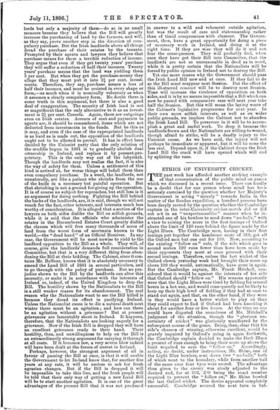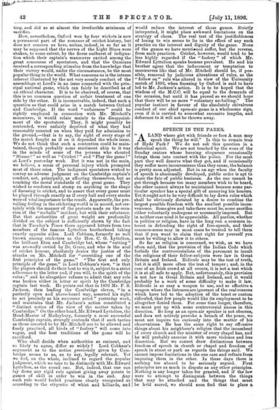ETHICS OF UNIVERSITY CRICKET.
T"past week has afforded another striking example of that concentration of the public mind on games which we discussed in a recent issue. There can hardly be a doubt that for one person whose mind has hemn seriously exercised by the question whether her Majesty's Government is acting " meanly " towards India in the matter of the Soudan expedition, a hundred persons have been deeply moved by the question whether the Cambridge captain in the inter-University cricket-match did or did not ad in an "unsportsmanlike" manner when he in- structed one of his bowlers to send down "no-balls," with a view to raising the score in the first innings of Oxford above the limit of 120 runs behind the figure made by the Light Blues. The Cambridge men, having in their first innings put together the handsome score of 319, got all the Oxford men but one out for 188. Now, according to the existing "follow on" rule, if the side which goes in second makes 120 runs fewer than have been made by their opponents they must at once proceed with their second innings. Therefore, unless the last wicket of the Oxford eleven yesterday week had brought their score up above 199 they would, automatically, have gone in again. But the Cambridge captain, Mr. Frank Mitchell, con- sidered that it would be against the interests of his side that Oxford should "follow on." His reasons apparently were that the Light Blues were tired by fielding for several hours in a hot sun, and would consequently not be likely to keep up their high level of fielding if they had at once to stand out again, and that, on the other hand, if they went in they would have a better wicket to play on than they could expect to find if Oxford had been knocking it about for another four or five hours. At the time no one would have disputed the soundness of Mr. Mitchell's judgment of the situation, though the "glorious un- certainty of cricket" was gloriously manifested by the subsequent course of the game. Being, then, clear that his side's chances of winning, otherwise excellent, would be gravely impaired by Oxford's going in again forthwith, the Cambridge captain decided to make the Dark Blues a present of runs enough to brine' their score up above the limit required to save the "follow on." Accordingly. acting, no doubt, under instructions, Mr. Shine, one of the Light Blue bowlers, sent down two "no-balls," both of which went to the boundary, while from another ball of the same over four byes were scored. The advantage thus given to the enemy was nicely adjusted to the desired end, for at 202, 200 being the exact number required to prevent the "follow on," Mr. Shine bowled the last Oxford wicket. The device appeared completely successful. Cambridge secured the next turn in bat- dog, and did so at almost the irreducible minimum of sacrifice.
How, nevertheless, Oxford won by four wickets is now a permanent part of the romance of cricket history, but does not concern us here, unless, indeed, in so far as it may be supposed that the nerves of the Light Blues were shaken, to some extent, by the fierce outburst of indigna- tion which their captain's manceuvre excited among the great concourse of spectators, and that the Oxonians received a corresponding stimulus from the knowledge that their victory would, under the circumstances, be the most popular thing in the world. What concerns us is the intense interest illustrated by the not very seemly conduct of the assemblage at Lord's in an issue connected with the prin- cipal national game, which can fairly be described as of an ethical character. It is to be observed, of course, that this is no common question of unfair treatment of one side by the other. It is inconceivable, indeed, that such a question as that could arise in a match between Oxford and Cambridge. If the word " unfairness " could be rightly employed in connection with Mr. Mitchell's manceuvre, it would relate mainly to the disappoint- ment of the spectators. They, it might possibly be contended, were unfairly deprived of what they had reasonably counted on when they paid for admission to the ground,—that is to say, the sight of every stage of the match fought as if on it depended the whole issue. We do not think that such a contention could be main- tained, though probably some sentiment akin to it was in the minds of some of the persons who shouted " Shaine ! " as well as " Cricket ! " and "Play the game !" at Lord's yesterday week. But it was not in the main, we believe, a sense of personal injury which prompted most of those cries. The indignant spectators wished to convey an adverse judgment on the Cambridge captain's conduct, not, principally, as affecting themselves, but as touching the moral standards of the great game. They wished to condemn and stamp on anything in the shape of finessing in cricket, and to assert that every game must be played through exactly as if every ball and every stroke were of vital importance to the result. Apparently, the pre- vailing feeling in the cricketing world is in accord, not cer- tainly with the manner of the protests made on the occa- sion of the "no-balls" incident, but with their substance. But that authorities of great weight are profoundly divided on the subject is sufficiently shown by the fact that in Tuesday's Times there appeared letters from two members of the famous Lyttelton brotherhood taking exactly opposite sides. Lord Cobham, formerly so well known among cricketers as the Hon. C. G-. Lyttelton, the brilliant Eton and Cambridge bat, whose "cutting" was avowedly envied by Dr. Grace, and who is the soul of cricket honour, absolutely denies the justice of the attacks on Mr. Mitchell for "overriding one of the first principles of the game." "The first and only principle of the game," in Lord Cobham's view, "is that the players should do their best to win it, subject to a strict adherence to the letter and, if you will, to the spirit of the rules ;" and he altogether refuses to admit that any rule was broken either in letter or spirit by the Cambridge captain last week. He points out that in 1893 Mr. F. S. Jackson, then leading the Cambridge eleven, "in a ,perfectly open and above-board way, asserted his right to act precisely as his successor acted" yesterday week, and maintains that Mr. Jackson's action constituted a "distinct notice of the view of the matter taken by Cambridge." On the other hand, Mr. Edward Lyttelton, the Head-Master of Haileybury, formerly a most successful Cambridge captain, strongly contends that if such tactics as those resorted to by Mr. Mitchell are to be allowed and freely practised, all kinds of " foolery " will come into vogue, and the best traditions of the game will be sacrificed.
Who shall decide when authorities so eminent, and so likely to agree, differ so widely ? Lord Cobham's argument as to the notice previously given by Cam- bridge seems to us, so to say, legally relevant. Yet we feel, on the whole, inclined to regard the popular judgment, which we take to be distinctly with Mr. Edward Lyttelton, as the sound one. Not, indeed, that one can lay down any rigid rule against giving away points in games of skill in order to win in the end. Any such rule would forbid practices clearly recognised as according to the etiquette of whist and billiards, and would reduce the interest of those games. Strictly interpreted, it might place awkward limitations on the strategy of chess. The real test of the justifiableness of losing to win seems to lie in the effect of any such practice on the interest and dignity of the game. None of the games we have mentiened suffer, but the reverse, from such practices. Cricket, however, would tend to be less highly regarded if the " foolery " of which Mr. Edward Lyttelton speaks became prevalent. He and his brother agree that the inducement or temptation to manceuvres like that of Mr. Mitchell should be, if pos- sible, removed by judicious alterations of rules, as the "follow on" rule was altered in view of the University match of 1893, when finessing by Oxford is said to have led to Mr. Jackson's action. It is to be hoped that the wisdom of the M.C.C. will be equal to the demands of the occasion, but until it has proved so we should hope that there will be no more "voluntary no-balling." The popular instinct in favour of the absolutely chivalrous conduct of our chief open-air game is a wholesome sign, even if it is carried to somewhat excessive lengths, and deference to it will not be thrown away.



































 Previous page
Previous page